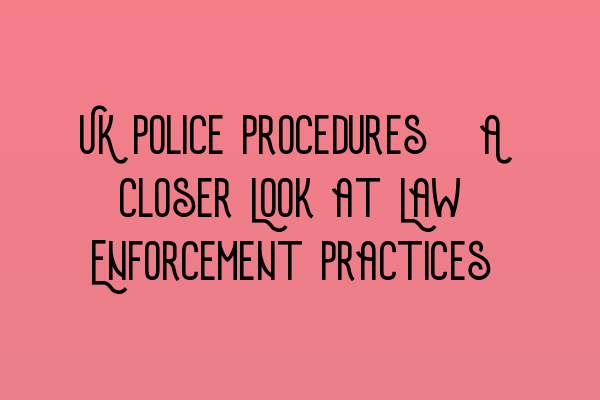UK Police Procedures: A Closer Look at Law Enforcement Practices
Welcome to the SQE Criminal Law & Practice blog! Today, we are going to take a closer look at UK Police Procedures and explore the law enforcement practices followed by police officers. Understanding these procedures is crucial for aspiring criminal law practitioners to navigate the intricacies of the legal system effectively.
The Criminal Justice System in the UK
Before delving into police procedures, let’s first understand the structure of the criminal justice system in the UK. The system comprises various institutions and agencies that work together to uphold the law and ensure justice is served. These include the police, prosecution, defense, courts, and prisons.
At the heart of this system lies the police, who play a vital role in maintaining law and order. They are responsible for investigating crimes, apprehending offenders, and gathering evidence. But how do they go about accomplishing these tasks? Let’s find out!
1. Arrest and Detention
One of the key aspects of UK police procedures is the power to arrest and detain individuals suspected of committing a crime. The police must have reasonable grounds to believe that an offense has been committed and that the person being arrested is responsible for it.
During the arrest, the police must inform the suspect of their rights, including the right to remain silent and the right to legal representation. This ensures that suspects are aware of their entitlements and can exercise them effectively.
2. Interrogation and Interviewing
Once a suspect is arrested, the police may conduct an interrogation or interview to gather evidence and obtain a confession. It is essential to note that suspects have the right to legal representation during these procedures. This protects their interests and ensures that the evidence obtained is admissible in court.
Thorough training is provided to police officers to ensure that interrogations and interviews are conducted in a fair and ethical manner. The law strictly prohibits the use of coercion or undue pressure to obtain a confession.
3. Evidence Collection
Evidence plays a crucial role in any criminal case. The police are responsible for collecting and preserving evidence to build a strong case against the accused. This evidence can include physical evidence, witness statements, photographs, CCTV footage, and more.
Police officers undergo training to ensure they adhere to proper evidence collection procedures. They must document, label, and preserve the evidence in accordance with the law to maintain its integrity and reliability.
4. Adherence to Legal Guidelines
UK police procedures are governed by legal guidelines and codes of practice, such as the Police and Criminal Evidence Act (PACE) and the College of Policing’s Authorised Professional Practice (APP).
These guidelines provide comprehensive instructions on how the police should conduct themselves during investigations, arrests, interviews, and evidence collection. They aim to ensure that the rights of suspects are protected, and the evidence obtained is admissible in court.
5. Continuous Professional Development
Keeping up with the ever-evolving landscape of criminal law is crucial for police officers. Continuous professional development (CPD) programs and training workshops are conducted to enhance their knowledge and skills.
At SQE Criminal Law & Practice, we offer workshops and seminars on criminal practice that can help aspiring criminal law practitioners expand their expertise. Attending these workshops can provide valuable insights into the latest developments in UK criminal laws. Click here to learn more about our workshops and seminars.
Stay Informed and Prepared
As the legal landscape evolves, it is crucial for criminal law practitioners to stay informed and prepared. Regularly updating your knowledge of UK criminal laws is essential to provide effective legal representation to your clients.
Our blog is dedicated to providing timely updates in UK criminal laws and sharing insightful articles to help you stay informed and prepared. Click here to explore our articles on updates in UK criminal laws.
Preparing for SQE Criminal Practice Exam
For aspiring criminal law practitioners, preparing for the SQE Criminal Practice Exam is a crucial step towards their career goals. Mock tests and exam simulations play a vital role in this preparation process.
Enhance your preparation with our mock tests for SQE Criminal Practice, designed to simulate the exam environment and help you perform your best on the actual exam day. Click here to learn more about our mock tests and exam simulations for SQE Criminal Practice.
Collaborative Study Group Experience
Studying in a collaborative environment can significantly enhance your understanding of SQE Criminal Law. Joining a study group allows you to discuss and analyze complex legal concepts with fellow learners.
Our blog also provides insights on enhancing your SQE Criminal Law study group experience. Click here to explore our article on enhancing your study group experience.
Conclusion
Understanding UK police procedures is essential for anyone aspiring to practice criminal law. The procedures involved in arrests, interrogations, evidence collection, and adherence to legal guidelines play a crucial role in ensuring justice is served.
At SQE Criminal Law & Practice, we aim to provide valuable insights and resources for aspiring criminal law practitioners. Stay tuned to our blog for more articles on decoding criminal evidence rules, analyzing legal cases, and expanding your expertise.
Interested in learning more about criminal law and practice? Explore our website and discover the resources we have to offer!
